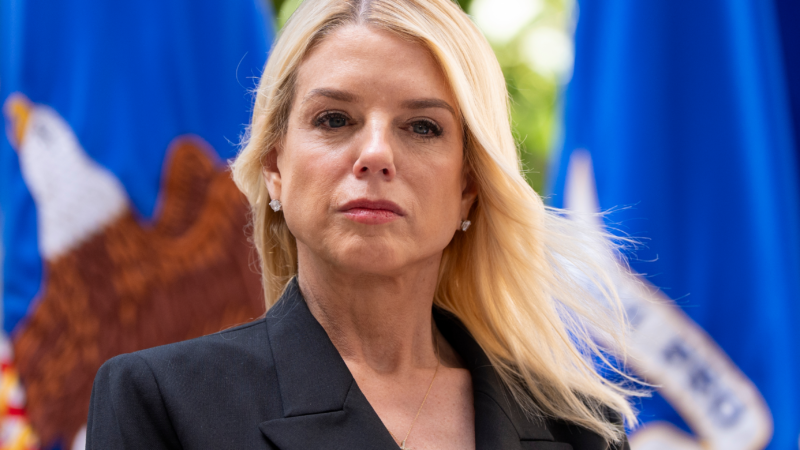Justice Department cuts to public safety grants leave police and nonprofits scrambling
The Justice Department has drastically scaled back its support for anti-crime initiatives across the country, leaving law enforcement agencies and private groups scrambling to try to replace the money. The cuts were announced in late April, and the Council on Criminal Justice estimates 373 grants were terminated, totaling about $500 million.
The sweeping nature of the cuts took many public safety groups by surprise.
“We knew that there were federal cuts coming,” says Kelsie McDaniel, the district attorney in Union County, Oregon. “But we didn’t think that it would include things that were within the program goals and agency priorities that the DOJ had previously talked about.”
Her office used a federal grant to pay for an investigator to do more in-depth crime investigations, such as building a case against fentanyl dealers whose product had led to fatal overdoses.
“We wouldn’t be able to do that without him,” McDaniel says. “We thought, well, where other programs might be getting cut, we thought we might actually see an increase in funding.”
Instead, that grant was one of the ones cancelled. Most of the money had already been spent, but she worries that the cancellation means Union County won’t be able to get this kind of federal funding again in the future.
“Federal grants allow agencies to really do things that they wouldn’t ordinarily otherwise be able to do,” says Jim Burch, president of the National Policing Institute, which helped distribute many of the grants to rural law enforcement. He says the sudden cuts, many of them mid-stream, “could result in layoffs of things like crime analysts and IT professionals. And it could mean that the agency has fewer staff for patrol services.”
Many grant recipients suspect there wasn’t much research behind the cuts.
“They don’t know what they’re doing. They’re just pulling things apart,” says Aqeela Sherrills, co-founder and executive director of the Community Based Public Safety Collective, which provides training and assistance to community violence intervention groups — the “violence interrupter” model that started in the 1990s.
“Many of these organizations are mostly volunteer, like, kind of small mom and pop agencies,” Sherrills says. “But the Biden administration turbocharged community violence intervention as a strategy,” with the 2022 passage of the Bipartisan Safer Communities Act, which dedicated $250 million over five years to this approach. Now the Trump administration is turning off that tap.
“We received a letter on April 22nd basically saying, ‘Stop all services,’ and ‘We are terminating your contract effective immediately,'” Sherrills says. He says the letter said his organization’s grant did not “align” with the administration’s priorities — the same explanation in other termination letters.
He says his organization is able to keep functioning for now, and its pivoted to showing local community violence intervention groups how to appeal the loss of their grants.
“We’re not taking the decision from the Trump administration laying down,” he says.
In response to NPR’s request for comment, the Justice Department sent a written statement:
“This Department of Justice is focused on prosecuting criminals, getting illegal drugs off the streets, and protecting all Americans from violent crime. Discretionary funds that are not aligned with the administration’s priorities are subject to review and reallocation.”
The statement added that the Department was committed to “working with” organizations and to hear appeals to restore funding, “as appropriate.”
In some cities, self-appointed fiscal watchdogs have complained about a lack of accountability in the way federal grants are spent. In Minneapolis, for instance, attorney Dean Thomson sued the city a couple of years ago to force local violence intervention groups to be more transparent.
“Taxpayers don’t know how their funds are being spent because the city didn’t know how their funds were being spent,” Thomson says. “And who knows whether the funds actually went to violence interruption or not?”
Thomson says the city settled with him, promising to require better bookkeeping by violence intervention groups that receive the grants.
He says his concern about accountability does not mean he endorses the Trump administration’s sweeping cuts.
“I think drastically cutting any program without investigating whether or not it’s working is the wrong approach,” Thomson says.
As it happens, that kind of information is increasingly available, according to Thomas Abt, founding director of the Violence Reduction Center, at the University of Maryland, which studies strategies for reducing violent crime. It’s preparing to release a major study of the track records of different kinds of programs.
“To do that work, we rely on a vast body of research — much of which has been funded by the federal government,” Abt says.
It’s the kind of information that could have informed decisions about which grants to keep and which to pull, but Abt says he’s seen no sign that the administration sought out that information.
“You would think that making a policy change this dramatic and this abruptly, that there would be some consultation before doing so. But in fact, there wasn’t,” he says.
His brother’s mental illness isolated his family. Now he’s helping other caregivers
When it comes to serious mental illness, family caregivers are crucial partners. But often, they must fend for themselves. A new solution offers them support.
Out with the mayo: How Ukrainians reclaim holiday food
For many people from former Soviet countries, New Year's is a big holiday feast time. A Ukrainian restaurant in Washington gives NPR a taste of what's on the menu.
50 wonderful things from 2025
Each year, critic Linda Holmes looks back on the year and compiles a list of the things that brought her joy.
Farmers are about to pay a lot more for health insurance
Tariffs, inflation, and other federal policies have battered U.S. farmers' bottom lines. Now many farmers say the expiration of federal health care subsidies will make their coverage unaffordable.
Why do we make New Year’s resolutions? A brief history of a long tradition
One of the earliest mentions of New Year's resolutions appeared in a Boston newspaper in 1813. But the practice itself can be traced back to the Babylonians.
Judge orders new trial for Alabama woman sentenced to 18 years in prison after stillbirth
Lee County Circuit Judge Jeffrey Tickal vacated Brooke Shoemaker’s 2020 conviction for chemical endangerment of a child resulting in death. Tickal said Shoemaker's attorneys presented credible new evidence that the infection caused the stillbirth.








